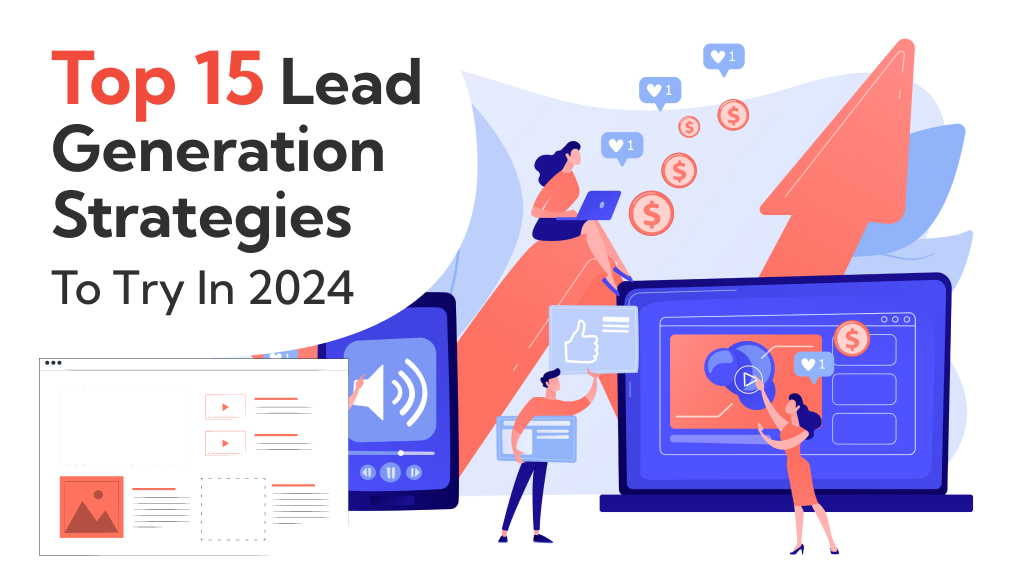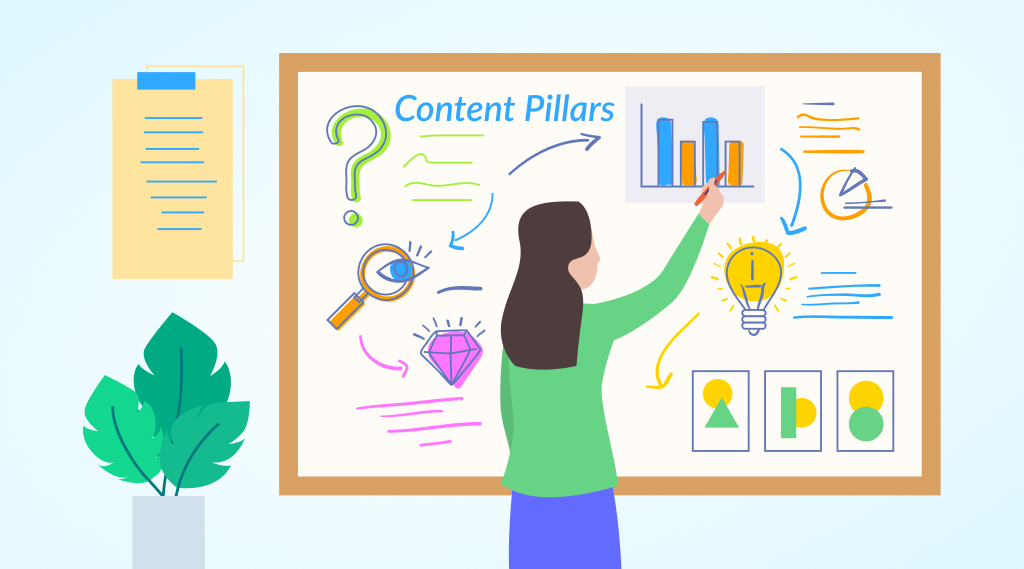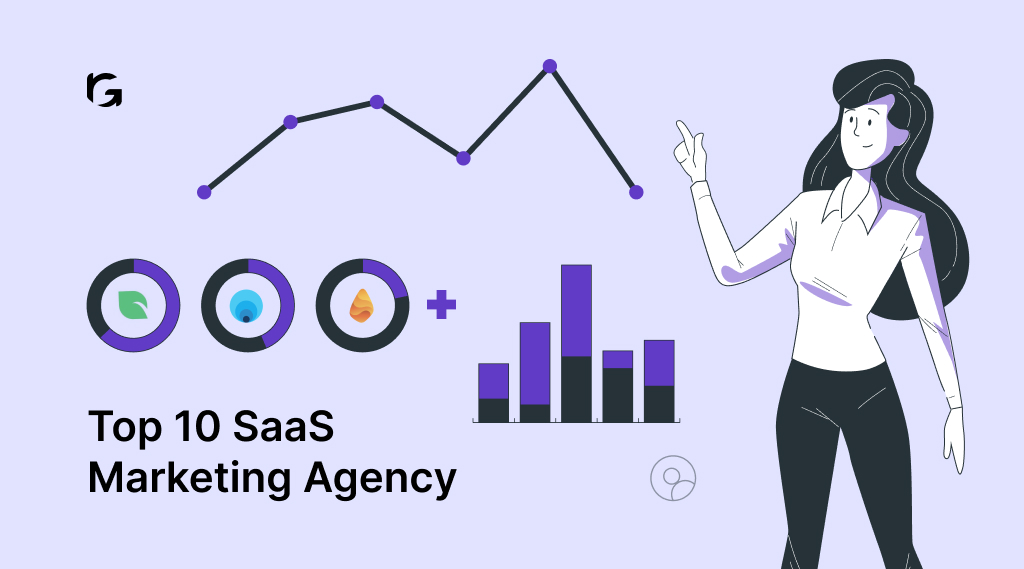Introduction
In the ever-evolving landscape of digital marketing, lead generation remains the lifeblood of businesses striving for growth and success. As we step into 2024, the competition is fiercer than ever, making it crucial for organizations to stay at the forefront of innovative strategies to capture high-quality leads.
In this blog, we’ll delve into the dynamic world of lead generation and unveil the top 15 strategies you need to explore in 2024. Whether you’re a seasoned marketer looking to fine-tune your tactics or a newcomer eager to master the art of lead generation, you’re in the right place.
Join us as we uncover the latest trends, proven methods, and cutting-edge technologies that will empower you to generate a steady stream of high-quality leads and drive your business to new heights. Let’s embark on this journey to discover the most effective lead generation strategies that will define the year 2024.
What Is Lead Generation?
Lead generation is the lifeblood of any successful business. It is the process of identifying and cultivating potential customers or leads who have expressed an interest in your products or services. The aim is to move these individuals through your sales funnel, ultimately converting them into paying customers. In essence, lead generation is the foundation of the customer acquisition process.
This process typically begins with the collection of potential lead information, often through various marketing tactics such as website forms, social media, email campaigns, or even in-person events. Once collected, these leads can be categorized and prioritized based on their likelihood to convert into customers.
Effective lead generation strategies involve understanding your target audience, creating compelling content, and nurturing leads through personalized interactions. The ultimate goal is to provide value to your potential customers and build a relationship with them, so they choose your product or service when the time is right.
What Are The Two Types Of Lead Generation?
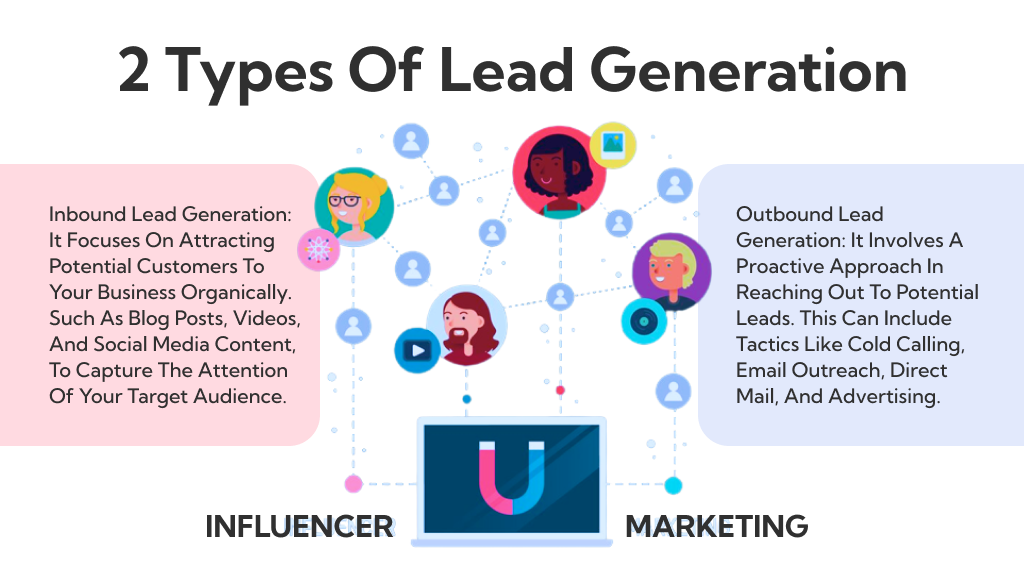
There are primarily two types of lead generation: Inbound and Outbound.
Inbound Lead Generation: Inbound lead generation focuses on attracting potential customers to your business organically. It relies on creating valuable and relevant content, such as blog posts, videos, and social media content, to capture the attention of your target audience. Inbound marketing strategies often center on SEO, content marketing, social media marketing, and email marketing, where the goal is to pull in leads who are actively seeking information or solutions related to your industry.
Outbound Lead Generation: Outbound lead generation, on the other hand, involves a proactive approach in reaching out to potential leads. This can include tactics like cold calling, email outreach, direct mail, and advertising. Outbound strategies aim to identify and connect with potential leads who may not have expressed an immediate interest in your products or services. While outbound lead generation can be more challenging in terms of getting a response, it can be an effective way to reach a broader audience and generate leads from various sources.
Why Do Most Lead Generation Fail?
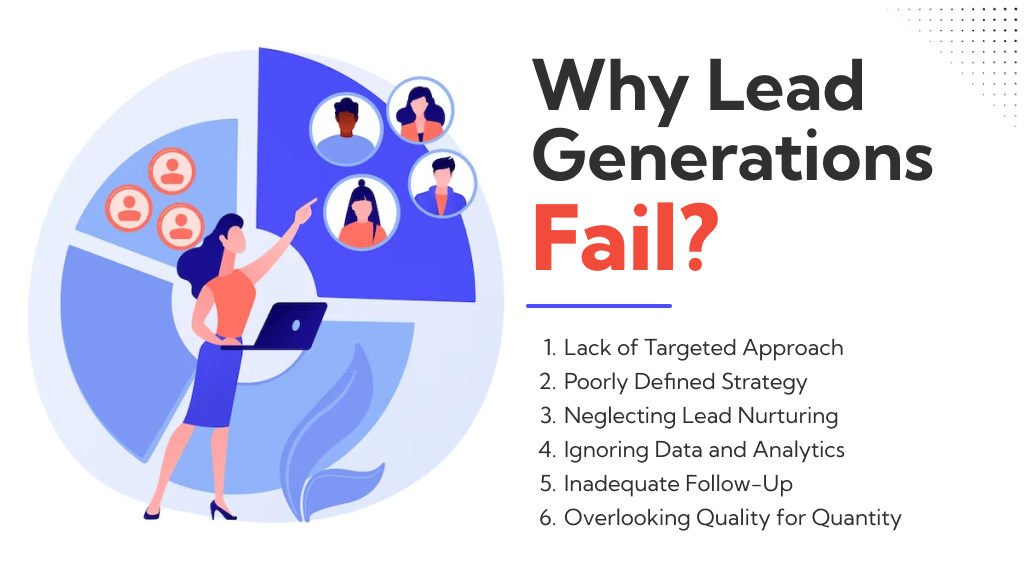
Lead generation, while essential, can often be a challenging process, and several factors can contribute to its failure:
1. Lack of Targeted Approach: Failing to identify and target the right audience is a common pitfall. A generic approach may generate leads, but they might not be the high-quality leads that convert into customers.
2. Poorly Defined Strategy: A well-defined lead generation strategy is crucial. Without clear goals, metrics, and a systematic approach, efforts can become disjointed and less effective.
3. Neglecting Lead Nurturing: Generating leads is only part of the process. Neglecting to nurture these leads with valuable content and personalized interactions can lead to a drop in interest and lost opportunities.
4. Ignoring Data and Analytics: Effective lead generation relies on data and analytics to measure success and adjust strategies accordingly. Failing to track and analyze results can hinder improvement.
5. Inadequate Follow-Up: Timely follow-up is crucial in converting leads into customers. Many leads are lost due to delayed or insufficient follow-up efforts.
6. Quality for Quantity: Quantity is important, but not at the expense of lead quality. Prioritizing quantity over quality can lead to a high number of unqualified leads that never convert.
In the complex world of lead generation, success often hinges on finding the right balance between inbound and outbound strategies, refining your approach, and continually adapting to changes in the market and consumer behavior.
What Are The 3 Approaches Of Lead Generation?
Lead generation is not a one-size-fits-all process, and it can be approached in various ways depending on your business and target audience. Here are three distinct approaches to lead generation:
Inbound Lead Generation:
Inbound lead generation involves creating content and strategies that attract potential customers to your business naturally. This approach is centered around providing value and building relationships with your target audience. Key components of inbound lead generation include:
- Content Marketing: Creating high-quality, relevant content such as blog posts, ebooks, videos, and infographics to inform and engage your audience.
- Search Engine Optimization (SEO): Optimizing your website and content to rank well in search engine results, making it easier for potential customers to find you.
- Social Media Marketing: Utilizing social platforms to share content, engage with your audience, and build a community around your brand.
- Email Marketing: Nurturing leads through personalized email campaigns that provide valuable information and guide prospects through the sales funnel.
- Content Offers: Offering resources like whitepapers, webinars, or free trials in exchange for contact information to capture and nurture leads.
Outbound Lead Generation:
Outbound lead generation takes a proactive approach in reaching out to potential leads. While it may involve interrupting potential customers to some extent, it can still be highly effective when executed strategically. Key components of outbound lead generation include:
- Cold Calling: Reaching out to potential leads via phone calls, typically with a well-defined script and a targeted approach.
- Email Outreach: Sending personalized, targeted emails to potential leads to introduce your products or services and initiate a conversation.
- Direct Mail: Sending physical marketing materials or promotional items through postal mail to grab the attention of potential leads.
- Paid Advertising: Using paid digital advertising channels such as Google Ads, Facebook Ads, or LinkedIn Ads to reach a specific audience with your message.
- Networking and Events: Attending industry events, conferences, and trade shows to meet potential leads in person and establish relationships.
Referral and Word-of-Mouth Marketing:
Referral and word-of-mouth marketing relies on your existing customers or network to refer potential leads to your business. These leads often come with a high level of trust and credibility. Key components of referral and word-of-mouth marketing include:
- Customer Referrals: Encouraging satisfied customers to refer friends, family, or colleagues to your business in exchange for incentives or rewards.
- Affiliate Marketing: Partnering with individuals or businesses who promote your products or services and receive a commission for each successful referral.
- Online Reviews and Testimonials: Encouraging customers to leave positive reviews and testimonials on platforms like Yelp, Google Reviews, or your website, building trust and credibility for your brand.
- Social Sharing: Encouraging customers to share their positive experiences with your brand on social media, reaching a broader audience.
What Are Your Fastest Lead Generation Options?
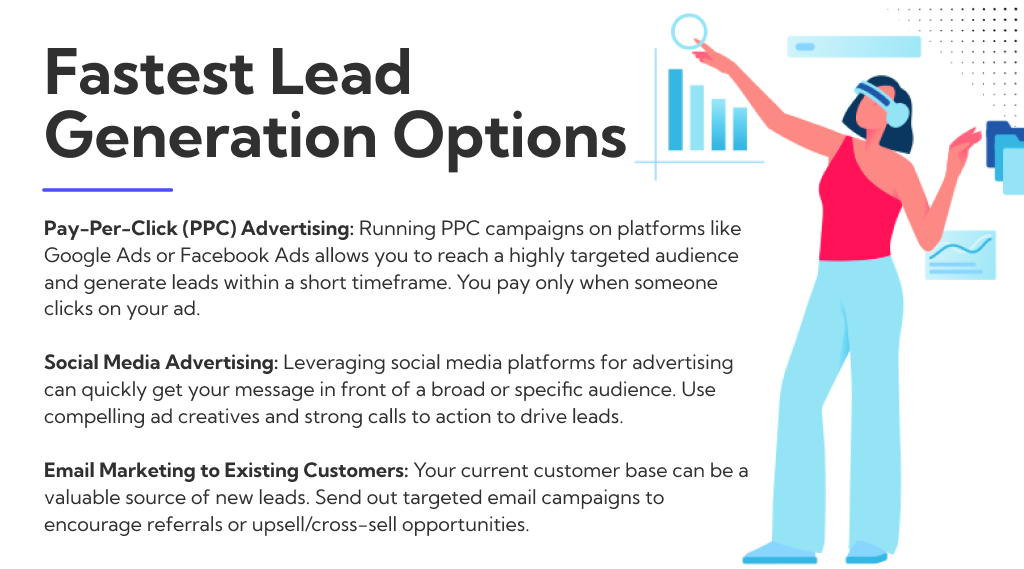
When you need leads quickly, there are several fast lead generation options to consider:
1. Pay-Per-Click (PPC) Advertising: Running PPC campaigns on platforms like Google Ads or Facebook Ads allows you to reach a highly targeted audience and generate leads within a short timeframe. You pay only when someone clicks on your ad.
2. Social Media Advertising: Leveraging social media platforms for advertising can quickly get your message in front of a broad or specific audience. Use compelling ad creatives and strong calls to action to drive leads.
3. Email Marketing to Existing Customers: Your current customer base can be a valuable source of new leads. Send out targeted email campaigns to encourage referrals or upsell/cross-sell opportunities.
4. Content Marketing with Gated Content: Create high-quality, valuable content and gate it behind a lead capture form. Promote this content to your target audience through various channels to quickly capture leads interested in your industry.
5. Networking at Events: Attending industry-specific events, trade shows, or conferences can yield immediate leads. Engage with attendees, exchange business cards, and follow up promptly.
6. Lead Generation Services: Consider using lead generation services or lead databases to purchase or acquire pre-qualified leads in your industry. This can be a fast way to jumpstart your sales pipeline.
7. Webinars and Live Events: Hosting webinars or live events with compelling topics and speakers can generate immediate interest and lead sign-ups. Encourage participants to engage further after the event.
Remember that speed should not compromise the quality of your leads. It’s essential to strike a balance between the urgency of lead generation and the relevance of the leads to your business. Tailor your approach to your specific goals and target audience to ensure a successful and rapid lead generation process.
How Do You Create High-Quality Leads?
Creating high-quality leads is essential for the long-term success of your business. High-quality leads are more likely to convert into paying customers and engage with your brand over time. Here’s how you can create high-quality leads:
1. Know Your Target Audience: To generate high-quality leads, you must understand your ideal customers. Create detailed buyer personas that include demographics, pain points, and motivations. This helps tailor your marketing efforts to attract those most likely to be interested in your products or services.
2. Offer Valuable Content: Content marketing is a powerful tool for attracting high-quality leads. Create informative, educational, and entertaining content that addresses your audience’s needs and concerns. This can include blog posts, ebooks, webinars, videos, and more.
3. Optimize Your Website: Ensure your website is user-friendly and optimized for search engines. High-quality leads are more likely to come from organic search traffic, so invest in SEO to improve your website’s visibility.
4. Use Gated Content: Create valuable resources and gate them behind lead capture forms. This allows you to collect contact information from individuals genuinely interested in your content.
5. Leverage Social Media: Engage with your audience on social media platforms. Share valuable content, participate in conversations, and use targeted advertising to attract potential leads.
6. Email Marketing: Build and nurture relationships with leads through email marketing. Segment your email list to send personalized content and offers that match each lead’s interests and behaviors.
7. Referral Programs: Encourage your current customers to refer others to your business. These referrals often result in high-quality leads because they come with a level of trust.
8. Networking and Partnerships: Connect with other businesses in your industry and explore partnership opportunities. Collaborations can introduce your brand to new, relevant audiences.
9. Online Reviews and Testimonials: Encourage satisfied customers to leave positive reviews and testimonials on platforms like Google Reviews, Yelp, and your website. Positive reviews build trust and credibility with potential leads.
10. Lead Scoring: Implement lead scoring to prioritize and qualify leads based on their actions and engagement with your content. This ensures that your sales team focuses on the leads most likely to convert.
11. Customer Education: Provide resources and information that educate potential customers about their problems and potential solutions. The more informed they are, the more likely they are to see your business as a trusted source.
How Do You Generate Leads Organically?
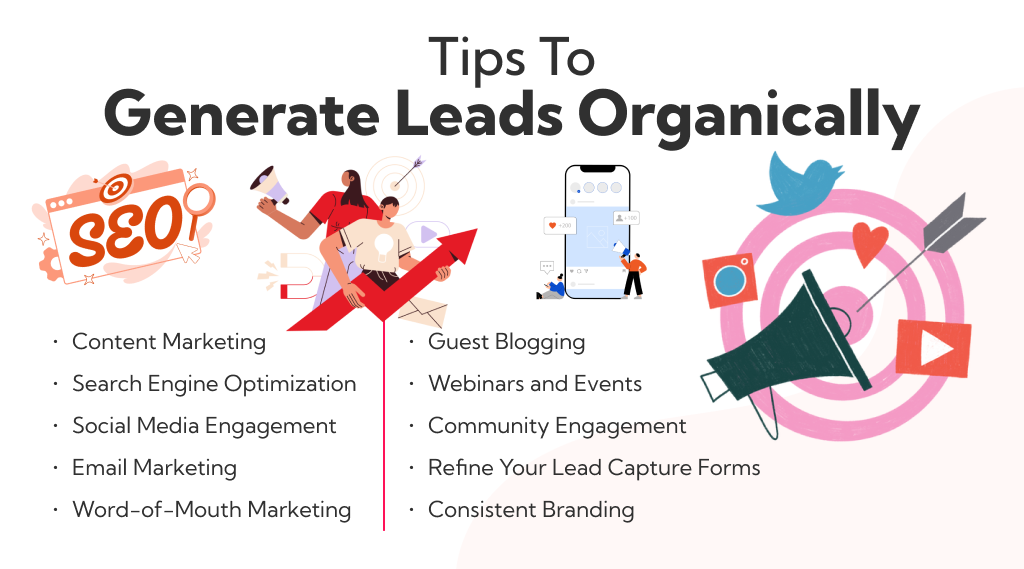
Generating leads organically means attracting potential customers without relying on paid advertising. This approach often results in more sustainable and cost-effective lead generation. Here are some strategies for organic lead generation:
1. Content Marketing: Create high-quality, informative, and engaging content that addresses the needs and pain points of your target audience. Consistently publishing blog posts, articles, videos, and other content can attract organic traffic to your website.
2. Search Engine Optimization (SEO): Optimize your website for search engines by using relevant keywords, meta tags, and high-quality backlinks. SEO helps improve your website’s visibility in search engine results, attracting organic traffic.
3. Social Media Engagement: Build an active presence on social media platforms relevant to your business. Share valuable content, engage with your audience, and participate in discussions to attract and interact with potential leads.
4. Email Marketing: Grow your email list organically by offering valuable content and incentives on your website. Encourage visitors to subscribe to your newsletter and nurture those leads through personalized email campaigns.
5. Word-of-Mouth Marketing: Encourage satisfied customers to spread the word about your business through referrals and positive reviews. Word-of-mouth marketing can generate organic leads with a high level of trust.
6. Guest Blogging: Contribute guest posts to reputable websites in your industry. This can help you reach a wider audience and establish your authority, driving organic traffic to your site.
7. Webinars and Events: Host webinars, workshops, or live events related to your industry. Promote these events to attract organic leads who have a specific interest in the topics you cover.
8. Community Engagement: Actively participate in online forums, industry-specific communities, and social media groups where your target audience congregates. Provide valuable insights and establish your expertise.
9. Refine Your Lead Capture Forms: Ensure that your website’s lead capture forms are user-friendly and strategically placed. Make it easy for visitors to share their information in exchange for valuable resources.
10. Consistent Branding: Maintain a consistent brand presence and messaging across all marketing channels. This helps build brand recognition and trust, attracting organic leads who resonate with your brand identity.
Organic lead generation takes time and effort, but it often results in higher-quality leads who are genuinely interested in your products or services. It’s a long-term strategy that focuses on building relationships and trust with your audience.
Top 15 Lead Generation Strategies In B2B You Should Try
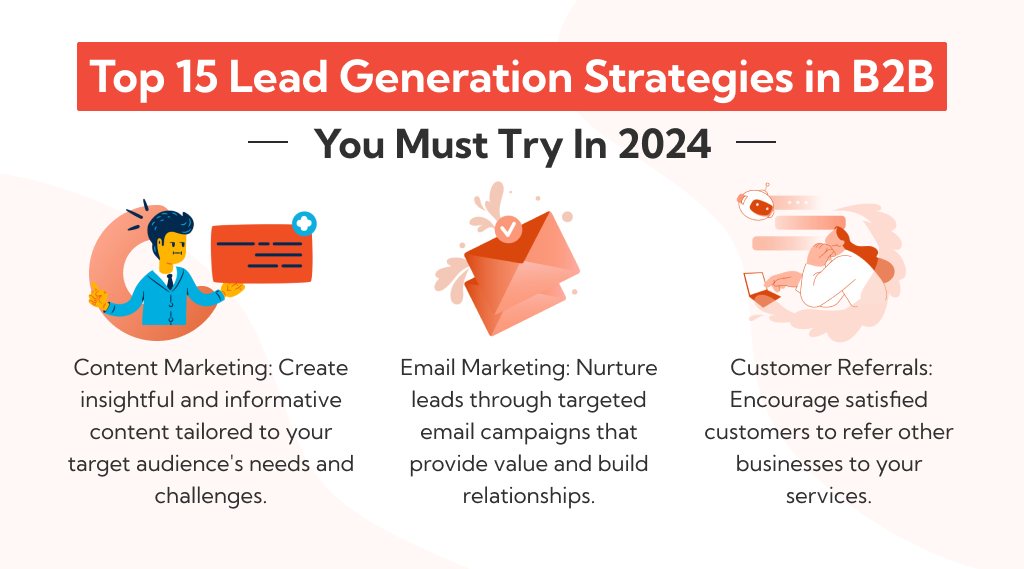
To help you navigate this dynamic landscape, we’ve compiled a list of the top 15 lead generation strategies that can elevate your B2B marketing efforts in 2024:
1. Content Marketing: Create insightful and informative content tailored to your target audience’s needs and challenges.
2. SEO and SEM: Optimize your online presence to boost organic and paid search visibility.
3. LinkedIn Marketing: Utilize LinkedIn to connect with professionals and showcase your expertise.
4. Email Marketing: Nurture leads through targeted email campaigns that provide value and build relationships.
5. Webinars and Virtual Events: Host webinars and virtual events to engage, educate, and capture valuable leads.
6. Account-Based Marketing (ABM): Focus on high-value accounts and tailor your marketing efforts to their specific needs.
7. Content Gating: Offer premium content in exchange for contact information, such as whitepapers, ebooks, or webinars.
8. Lead Nurturing: Implement automated lead nurturing workflows to guide prospects through the buyer’s journey.
9. Social Media Advertising: Use platforms like LinkedIn and Twitter for targeted B2B advertising.
10. Networking and Partnerships: Forge strategic partnerships with complementary businesses in your industry.
11. Customer Referrals: Encourage satisfied customers to refer other businesses to your services.
12. Trade Shows and Conferences: Attend industry-specific events and engage with potential leads in person.
13. Chatbots and AI: Employ AI-driven chatbots to engage website visitors and gather contact information.
14. Data Analytics: Use data-driven insights to refine your lead generation strategies and identify opportunities for improvement.
15. Innovative Technologies: Explore emerging technologies like interactive content and virtual reality to capture attention.
Conclusion
In the ever-evolving B2B landscape, mastering lead generation is essential for sustained growth and success. The 15 strategies we’ve explored provide a versatile toolkit to connect with your target audience, nurture leads effectively, and drive business growth in 2024. To thrive in this competitive environment, remember that a strategic, multi-faceted approach that combines these tactics is often the most effective. By continuously adapting to industry trends and the evolving needs of your audience, you’ll be well-positioned to excel in B2B lead generation and achieve your business objectives. Stay innovative, stay customer-focused, and stay ahead in the world of B2B lead generation.
Unlock your business’s full potential with RevvGrowth, the leading SaaS marketing agency. Drive growth, optimize strategies, and scale your success. Discover the power of SaaS marketing today!

